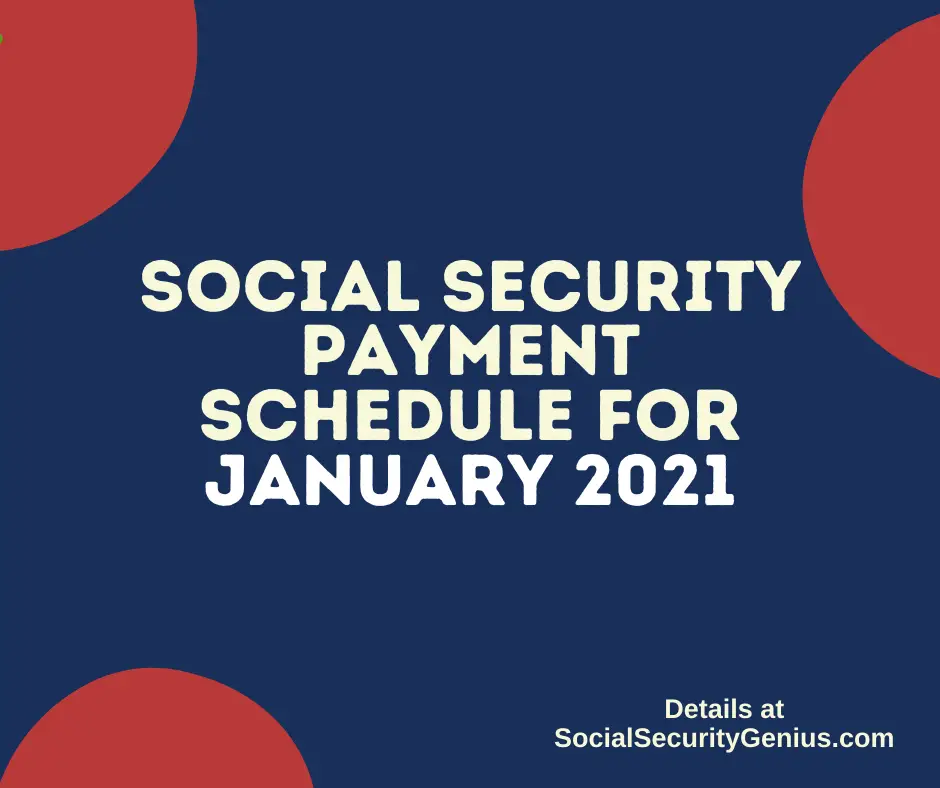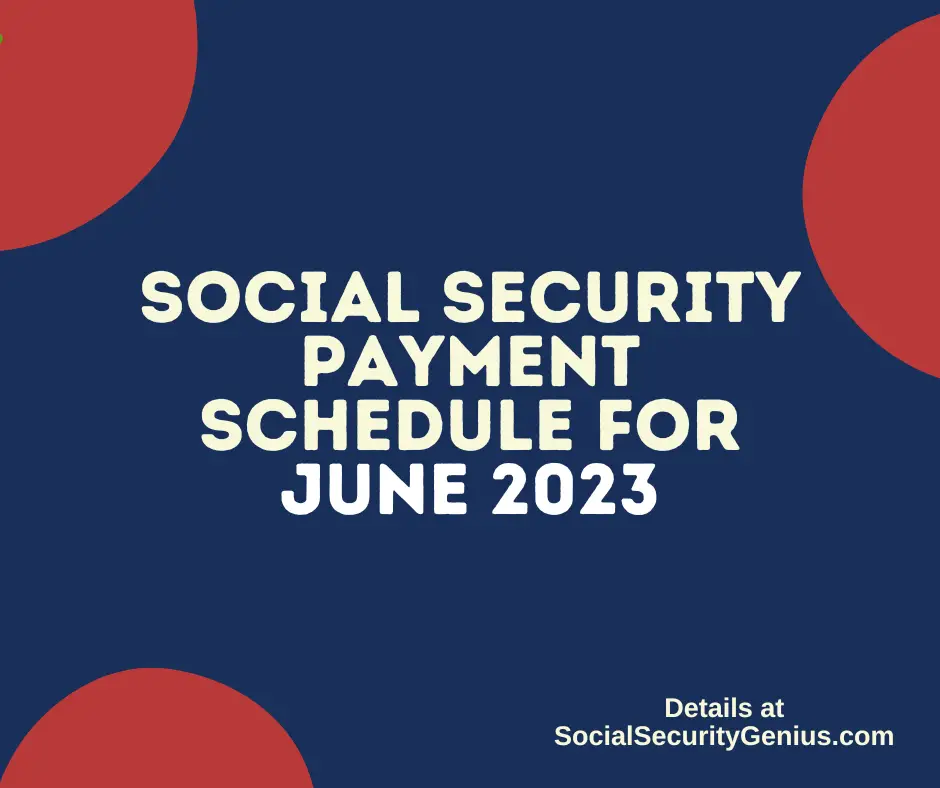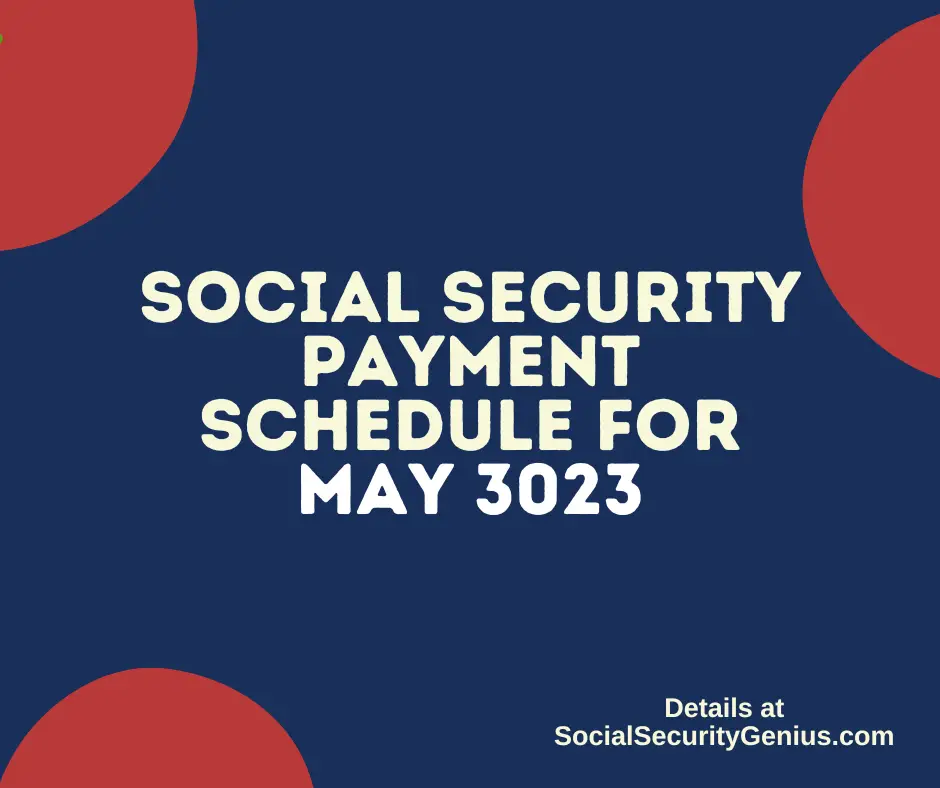If you are looking for the Social Security Payment Schedule for January 2021, look no further. We can help you. Social Security pays benefits in the month following the month for which they are due. For example, the December benefit is paid in January.
For those on Social Security retirement benefits or disability (SSDI or SSI), knowing when your payments will be deposited each month is crucial.
That’s because, for a majority, the monthly Social Security benefit is the main source of income.
Therefore, knowing the payment date helps you plan ahead and ensure that your bills are paid on time.
In addition, if you know when the payment will be deposited and available, you can plan for cash withdrawals from your account.
In the post below, we have explained in detail how the Social Security Payment Schedule works and provide you with the specific dates on which your January benefit payments will be deposited into your account.
Finally, we will also answer some of the most frequently asked questions about Social Security benefits.
Continue reading below for more details.

This Post will Cover:
- No More Paper Checks for Social Security Benefits
- How Social Security Payment Calendar Works
- Social Security Payment Schedule for January 2021
- Complete 2021 Social Security Payments Schedule
- What To Do If You Don’t Recieve Your Benefits
- Social Security Benefits Questions and Answers
No More Paper Checks for Social Security Benefits
Since 1935, the Social Security Administration (SSA) has mailed paper checks to Social Security beneficiaries.
However, that ended in May 2011.
That’s because Congress passed a law that required all recipients of payments from federal benefits programs to sign up for electronic payments.
Since then, all new recipients of Social Security and Supplemental Security Income disability have been required to sign up for electronic payments.
In addition, existing recipients of Social Security and SSI had to comply with the new requirements by March 1, 2013.
As a result, the SSA no longer mail paper checks for Social Security benefits, including disability payments.
There are two ways you can receive your Social Security benefits electronically:
Option 1 – Direct Deposit into Bank Account
First, you can choose to have your Social Security or Disability benefits direct deposited into an account with a bank or credit union.
If you choose this method of payment, your benefits will be automatically posted into your bank account on your payment date.
Option 2 – Direct Deposit into Direct Express Debit MasterCard
Second, if you do not have a bank account or are not able to get one, the Treasury Department has another solution for electronic payments:
You can sign up for a Direct Express Debit MasterCard, which is a prepaid debit card that works similar to a traditional bank debit card.
The Direct Express card is accepted anywhere Debit Mastercards are accepted.
Furthermore, you can also use your Direct Express debit card to make purchases online and over the phone.
Also, you can use the card to get cash back at the grocery store or to purchase money orders at the post office.
Click here to learn more about the Direct Express card.
What Happens if I Don’t Sign up for Electronic Payments?
If you just signed up to receive Social Security or Disability benefits and did not provide electronic payment information, here’s what will happen:
The SSA will make the choice for you and send your monthly benefit payments to you via the Direct Express debit card.
If you are already receiving Social Security or Disability benefits by check and have not signed up for electronic payments, here’s what to expect:
At some point soon, the SSA will switch your payments to a Direct Express card and a debit card will be mailed to you.
How Social Security Payment Schedule Works
If you are receiving Social Security Retirement or Social Security Disability Insurance benefits (SSDI), your payment date depends on your birth date.
In addition, If you are receiving payments on the record of a retired, disabled, or deceased worker (for example, spousal or survivor benefits), that person’s birthday sets the schedule.
Here’s how the Social Security Payment schedule works for those who receive Social Security retirement benefits or SSDI:
- If your birthday is in the first 10 days of the month, then you’ll receive your benefits payments on the second Wednesday of each month.
- For those with birthdays between the 11th and the 20th, benefit payments are deposited on the third Wednesday of the month.
- Payments are made on the fourth Wednesday of the month for those with birthdays on the 21st or later.
Here is a table that better displays how the payment schedule works:
| BIRTHDAY | PAYMENT DATE |
|---|---|
| 1st – 10th | Second Wednesday |
| 11th – 20th | Third Wednesday |
| 21st – 31st | Fourth Wednesday |
Now that you understand how the payment schedule works, it’s time to review the 2021 payment calendar as released by the SSA.
Exception
If you’ve been receiving Social Security benefits prior to May 1997 or you get both Social Security and SSI payments, here’s what you need to know:
Your payments will be made on the 3rd of each month. If the 3rd falls on a weekend or holiday, payment will be made on the preceding Friday.
Here is the complete SSI payment schedule for 2021.
We have first listed dates for those only receiving SSI benefits.
Next, we have provided dates for those receiving both Social Security retirement benefits and SSI.
Social Security Payment Schedule January 2021
Here is when to expect your Social Security payment for January 2021:
Social Security and Social Security Disability Insurance (SS and SSDI)
For those receiving Social Security Retirement Benefit or Disability Benefits, here is your payment schedule for January:
- If your birth date falls on the 1st – 10th day of the month, benefits are paid on January 13th.
- Also, if your birth date falls on the 11th – 20th day of the month, benefits are paid on January 20th.
- If your birth date falls on the 21st – 31st day of the month, benefits are paid on January 27th.
Supplemental Security Income (SSI) Payment Schedule
If you receive Supplemental Security Income (SSI), you will receive your payments on the 1st of each month.
The exception is when the 1st falls on a weekend or holiday.
If the first falls on a holiday, then you will receive your payment the business day before.
However, if the first falls on a weekend, you’ll receive your payment on the preceding Friday.
January 2021 SSI Payment Schedule
Since January 1st, 2021 falls on a holiday (New Year’s Day), SSI payments for the month will be deposited on Thursday, December 31st, 2020.
If you receive your payment via a bank account or a prepaid debit card like the Direct Express Debit card, you should see your benefits in your account on or before Thursday, December 31st.
Both SS and SSI Recipients
Since January 3, 2021, is on a Sunday and the weekday before (Friday) is a holiday (New Year’s Day), you will receive your benefits on Thursday, December 31st, 2020.
The Complete 2021 Social Security Payment Schedule
Here is a simplified version of the 2021 Social Security Payment Calendar for Social Security retirement benefits and SSDI beneficiaries.
If your birthday falls between the 1st and 10th:
- January 13
- February 10
- March 10
- April 14
- May 12
- June 9
- July 14
- August 11
- September 8
- October 13
- November 10
- December 8
If your birthday falls between the 11th and 20th:
- January 20
- February 17
- March 17
- April 21
- May 19
- June 16
- July 21
- August 18
- September 15
- October 20
- November 17
- December 15
If your birthday falls between the 21st and 31st:
- January 27
- February 24
- March 24
- April 28
- May 26
- June 23
- July 28
- August 25
- September 22
- October 27
- November 24
- December 22
Supplemental Security Income (SSI) Payment Schedule for 2021
For SSI recipients, benefits will arrive on the first of the month. If the 1st of the month falls on a Saturday, Sunday, or a federal holiday, you will be paid on the business day before then.
For example, if the 1st of the month falls on a Saturday, you’ll receive your benefits the Friday before.
| 2021 | SSI Only | Both SS & SSI |
| January | 31-Dec-2020 | 31-Dec-2020 |
| February | 1 | 3 |
| March | 1 | 3 |
| April | 1 | 2 |
| May | 30-Apr-2021 | 3 |
| June | 1 | 3 |
| July | 1 | 2 |
| August | 30-Jul-2021 | 3 |
| September | 1 | 3 |
| October | 1 | 1 |
| November | 1 | 3 |
| December | 1 | 3 |
What To Do If You Don’t Recieve Your Benefits
If you do not receive your payment on your specified day or date, the Social Security Administration asks that you wait three mailing days before contacting them.
You can contact Social Security at 1-800-772-1213.
See the February 2021 Social Security Payment Schedule.
Social Security Benefits Questions and Answers
Here is the summary of the most frequently asked Social Security Benefits Questions and Answers.
Will Social Security Get a Raise in 2021?
In 2021, Social Security recipients will see a 1.3 percent Cost of Living Adjustment (COLA) increase.
For the average person receiving Social Security benefits, their monthly Social Security check will rise by $20 to $1,543 in January from $1,523 in 2020.
In addition, the average retired couple who both collect Social Security benefits will see their check rise by $33 to $2,596, up from $2,563.
Furthermore, for Disability beneficiaries, their average monthly benefits will increase by $16 to $1,277 from $1,261.
Also, the maximum Social Security check for an individual retiring at full retirement age will rise to $3,148 a month in 2021 from $3,011 — an increase of $137.
How Does Social Security Spousal Benefits Work?
When it comes to Social Security retirement benefits, being married has its advantages.
Depending on your situation, taking spousal benefits may help you maximize how much in benefits you and your spouse receive.
However, how much you’ll receive depends on a number of factors, including:
- Your age
- The amount of your spouse’s benefit
- Whether you have other retirement benefits available to you
If you have not worked or do not have enough Social Security credits to qualify for your own Social Security benefits, you may be able to receive spousal benefits.
You qualify for spousal benefits if:
- Your spouse is already collecting retirement benefits.
- You have been married for at least a year.
- You are at least 62 (unless you are caring for a child who is under 16 or disabled, in which case the age rule does not apply).
Also, if you are divorced and your marriage lasted at least 10 years, you may be able to get benefits on your former spouse’s record.
Finally, If your spouse or ex-spouse is deceased, certain family members may be able to receive monthly benefits, including:
- A widow or widower age 60 or older (age 50 or older if disabled);
- A surviving divorced spouse, under certain circumstances;
- A widow or widower at any age who is caring for the deceased’s child who is under age 16 or disabled and receiving benefits on their record;
How Spousal Benefits are Calculated
When you claim Spousal benefits, you could get up to one-half the amount your spouse is entitled to receive at their full retirement age.
However, if you decide to start taking your spousal benefits before you reach full retirement age, your benefit amount will be permanently reduced.
For example, if your spouse is receiving $2,500 a month in Social Security benefits but you are only getting $800 a month, you can switch to spousal benefits.
If you make the switch to spouses benefits, you will receive one-half the amount your spouse is entitled to, which in this example will be $1,250.
Therefore, by switching to spousal benefits, you will be getting $450 more a month.
However, you will only get your full spousal benefit amount if you wait until you reach full retirement age to begin receiving benefits.
Other Worker Benefits
Furthermore, Spousal benefits are layered on top of any worker benefit you may have (for example, a pension).
If you have your own worker benefit like a pension, you are always paid that benefit first, then any amount of spousal benefit is layered on top of that.
Social Security Payment Dates 2021 Summary
Here’s the bottom line:
If you receive Social Security retirement benefits or SSDI, then your benefits will be paid based on your birthdate.
Furthermore, SSI (Supplemental Security Income) payments are issued on the first of every month.
For January 2021:
Social Security and SSDI payments will be made using the schedule below:
- on January 13th if your birth date falls on the 1st – 10th day of the month.
- If your birth date falls on the 11th – 20th day of the month, you will get your deposit on January 20th.
- Finally, if your birth date falls on the 21st – 31st day of the month, your benefits will be paid on January 27th.
For SSI recipients:
January 1st, 2021 falls on a holiday, therefore SSI payments for the month will be deposited on Thursday, December 31st, 2020.
Also, since January 3, 2021, is on a Sunday and the weekday before (Friday) is a holiday, you will receive your benefits on Thursday, December 31st, 2020.
Questions?
If you still have questions, you should leave a comment below.
However, what may be an even greater help is to join our FREE Facebook members group about Making Sense of Social Security Benefits.
It’s a very active group with some really smart people who love to answer any questions you may have about Social Security Benefits.
Also, from time to time, our team of editors drop in to contribute and answer questions.
Finally, you may like these popular articles, including How to Change Your Address with Social Security, the Top 5 Changes to Social Security in 2021, and 2021 Social Security Payment Calendar.


